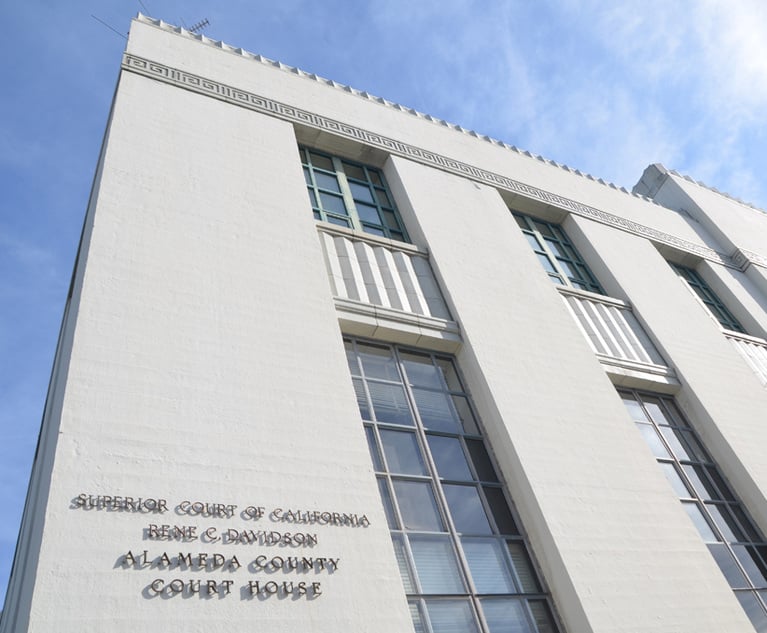San Francisco Bans Facial Recognition Technology Surveillance
The San Francisco Board of Supervisors voted Tuesday to pass “the Stop Secret Surveillance Ordinance” that prohibits city and county law enforcement agencies from using facial recognition systems.
May 14, 2019 at 07:17 PM
2 minute read
 San Francisco downtown seen from Twin Peaks.
San Francisco downtown seen from Twin Peaks.
Lawmakers in San Francisco have passed a bill to ban the use of facial recognition technology in surveillance by local agencies.
The San Francisco Board of Supervisors voted Tuesday to pass “the Stop Secret Surveillance Ordinance” that prohibits city and county law enforcement agencies from using facial recognition systems. The measure, which passed in an 8-1 vote, makes San Francisco the first U.S. city to outlaw the use of such technology for surveillance.
California law requires two votes for an ordinance to go into effect, but the second vote is at this point is largely seen as a formality. After the bill receives the board's final sign-off next week, San Francisco's facial-recognition ban will go into effect 30 days later.
The ordinance, introduced by San Francisco Supervisor Aaron Peskin, also would require city departments to get public input and board approval for acquiring any new surveillance technology and audits on the city's existing surveillance technology, including license plate readers and surveillance cameras.
While San Francisco is the first to ban facial recognition, similar proposals are under consideration in Oakland and in Somerville, Massachusetts, outside of Boston. The Massachusetts Senate also is considering a bill that would put a moratorium on the use of facial recognition until new regulations are enacted.
This content has been archived. It is available through our partners, LexisNexis® and Bloomberg Law.
To view this content, please continue to their sites.
Not a Lexis Subscriber?
Subscribe Now
Not a Bloomberg Law Subscriber?
Subscribe Now
NOT FOR REPRINT
© 2025 ALM Global, LLC, All Rights Reserved. Request academic re-use from www.copyright.com. All other uses, submit a request to [email protected]. For more information visit Asset & Logo Licensing.
You Might Like
View All
Fresh lawsuit hits Oregon city at the heart of Supreme Court ruling on homeless encampments
4 minute read


Federal Judge Pauses Trump Funding Freeze as Democratic AGs Plan Suit
4 minute readTrending Stories
- 1Litigators of the Week: A $630M Antitrust Settlement for Automotive Software Vendors—$140M More Than Alleged Overcharges
- 2Litigator of the Week Runners-Up and Shout-Outs
- 3Linklaters Hires Four Partners From Patterson Belknap
- 4Law Firms Expand Scope of Immigration Expertise, Amid Blitz of Trump Orders
- 5Latest Boutique Combination in Florida Continues Am Law 200 Merger Activity
Who Got The Work
J. Brugh Lower of Gibbons has entered an appearance for industrial equipment supplier Devco Corporation in a pending trademark infringement lawsuit. The suit, accusing the defendant of selling knock-off Graco products, was filed Dec. 18 in New Jersey District Court by Rivkin Radler on behalf of Graco Inc. and Graco Minnesota. The case, assigned to U.S. District Judge Zahid N. Quraishi, is 3:24-cv-11294, Graco Inc. et al v. Devco Corporation.
Who Got The Work
Rebecca Maller-Stein and Kent A. Yalowitz of Arnold & Porter Kaye Scholer have entered their appearances for Hanaco Venture Capital and its executives, Lior Prosor and David Frankel, in a pending securities lawsuit. The action, filed on Dec. 24 in New York Southern District Court by Zell, Aron & Co. on behalf of Goldeneye Advisors, accuses the defendants of negligently and fraudulently managing the plaintiff's $1 million investment. The case, assigned to U.S. District Judge Vernon S. Broderick, is 1:24-cv-09918, Goldeneye Advisors, LLC v. Hanaco Venture Capital, Ltd. et al.
Who Got The Work
Attorneys from A&O Shearman has stepped in as defense counsel for Toronto-Dominion Bank and other defendants in a pending securities class action. The suit, filed Dec. 11 in New York Southern District Court by Bleichmar Fonti & Auld, accuses the defendants of concealing the bank's 'pervasive' deficiencies in regards to its compliance with the Bank Secrecy Act and the quality of its anti-money laundering controls. The case, assigned to U.S. District Judge Arun Subramanian, is 1:24-cv-09445, Gonzalez v. The Toronto-Dominion Bank et al.
Who Got The Work
Crown Castle International, a Pennsylvania company providing shared communications infrastructure, has turned to Luke D. Wolf of Gordon Rees Scully Mansukhani to fend off a pending breach-of-contract lawsuit. The court action, filed Nov. 25 in Michigan Eastern District Court by Hooper Hathaway PC on behalf of The Town Residences LLC, accuses Crown Castle of failing to transfer approximately $30,000 in utility payments from T-Mobile in breach of a roof-top lease and assignment agreement. The case, assigned to U.S. District Judge Susan K. Declercq, is 2:24-cv-13131, The Town Residences LLC v. T-Mobile US, Inc. et al.
Who Got The Work
Wilfred P. Coronato and Daniel M. Schwartz of McCarter & English have stepped in as defense counsel to Electrolux Home Products Inc. in a pending product liability lawsuit. The court action, filed Nov. 26 in New York Eastern District Court by Poulos Lopiccolo PC and Nagel Rice LLP on behalf of David Stern, alleges that the defendant's refrigerators’ drawers and shelving repeatedly break and fall apart within months after purchase. The case, assigned to U.S. District Judge Joan M. Azrack, is 2:24-cv-08204, Stern v. Electrolux Home Products, Inc.
Featured Firms
Law Offices of Gary Martin Hays & Associates, P.C.
(470) 294-1674
Law Offices of Mark E. Salomone
(857) 444-6468
Smith & Hassler
(713) 739-1250






